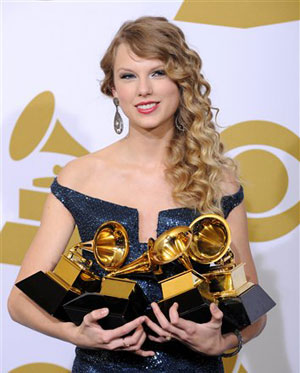
 Taylor Swift’s appearance on Monday night’s Grammy telecast, and the flood of media coverage that followed, illustrate that mega-fame and media saturation can be a double-edged sword. While the multi-platinum singer scooped up a record-setting four Grammys, including the coveted Album of the Year award, far more ink has been dedicated to her not-so-spot-on vocal duet with Stevie Nicks on the Fleetwood Mac classic, “Rhiannon.” Historically, the road from teenage phenomenon to long term success can be very bumpy, with most teen artists winding up in the where-are-they-now column. As she’s already clearly demonstrated, Swift is not most artists, but the stratospheric level of her success makes the leap to longevity all the more daunting.
Taylor Swift’s appearance on Monday night’s Grammy telecast, and the flood of media coverage that followed, illustrate that mega-fame and media saturation can be a double-edged sword. While the multi-platinum singer scooped up a record-setting four Grammys, including the coveted Album of the Year award, far more ink has been dedicated to her not-so-spot-on vocal duet with Stevie Nicks on the Fleetwood Mac classic, “Rhiannon.” Historically, the road from teenage phenomenon to long term success can be very bumpy, with most teen artists winding up in the where-are-they-now column. As she’s already clearly demonstrated, Swift is not most artists, but the stratospheric level of her success makes the leap to longevity all the more daunting.
In the weeks prior to the Grammy’s, Swift kept a relatively low profile, spending time in the studio, reportedly recording an album’s worth of material. It will be a few months before any of that new music sees the light of day, and the singer will be busy and perhaps slightly less ubiquitous, with a just-launched Australian tour. Meanwhile, bloggers and journalists continue to weigh in on Swift, her fame, her vocal abilities, and her future.
One especially insightful article was written by Jon Caramanica in the New York Times. He recognizes Swift’s strengths, and human frailties and casts them in the context of a rite of passage from teen to adult. Part of the article is below, read the complete article here.
Over the last three and a half years, Ms. Swift has established herself as pop’s leading naïf. Not in her songwriting, which has been precocious, but in her persona. By now, she’s even patented a look she whips out at award shows, concerts and more, when her innocence is threatened by acclaim: eyes wide, mouth agape, hand held over it as if to keep in the breath she’d just gasped as if it were her last.
Most stars — and make no mistake, Ms. Swift is the most important new pop star of the past few years — have their images undone by failure. In Ms. Swift’s case, the opposite is true: success has necessitated a re-evaluation.
Her Sunday night at the Grammys will be remembered as the turning point. She won four awards, including album of the year for “Fearless” (Big Machine), her outstanding second record — the youngest artist ever to do so, and the first solo female country singer to earn that as well. It was the ultimate stamp of insider approval for someone who insists that she’s thrilled just to be invited to the party.
But the night also revealed her weaknesses. […read on]



